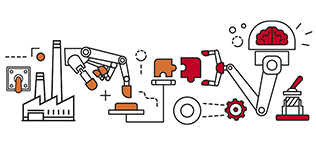Robotics as a lever for improving working methods and environments in the energy sector

Robotization is one of the main strands of Repsol’s digital transformation strategy, looking for greater efficiency, safety and functionality in all its processes. Its research center, Repsol Technology Lab, develops groundbreaking technology to be implemented on an industrial scale in Repsol’s various business lines. Its prime role is to test the technology and demonstrate its potential (“Thinking big, pilot small, scaling fast”). This R&D center, housing the Robotics & IoT Hub, works along three main lines: Process automation & Logistics, Demanding Environments and Confined Environments. Repsol Technology Lab taps into the technological skills of GMV, a cutting-edge, Industry-4.0 innovation firm, for the design, development and rollout of robotized cells in industrial processes automation projects, with the overall aim of improving working environments and methods.
On 29 September, to talk about examples that represent a technological and cultural change in the energy company, Repsol Technology Lab and GMV put on a webinar showing the needs, technological development and benefits accruing from two specific success stories: the robotic arm installed in a coking plant for opening and closing its reactors, and a logistic robot of autonomous transport carrying out the daily distribution of samples and equipment.
Two of the people most heavily involved in these projects took part in the Webinar; Alfonso García, Experimentation 5.0 Robotics Hub of Repsol Technology Lab, and Ángel C. Lázaro, Industry Business Partner of GMV’s Secure e-Solutions sector, who both stressed the crucial importance of involving people in the sector transformation, giving them the necessary skills to take on tasks of greater business benefit. The webinar was moderated by Emilia Martínez Serrano, Senior Manager of Advanced Mathematics and Process Optimization in Repsol Technology Lab.
Both projects represent the first step in defining new processes and demonstrating the feasibility of innovating technology before bringing it up to industrial scale, driving what Repsol has dubbed “Experimentation 5.0”.